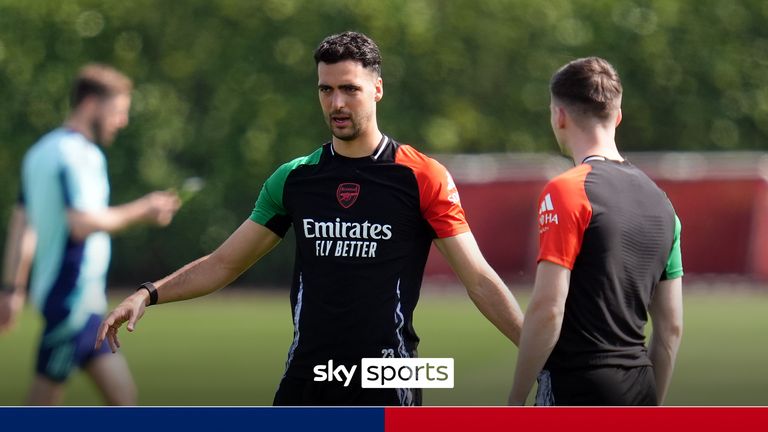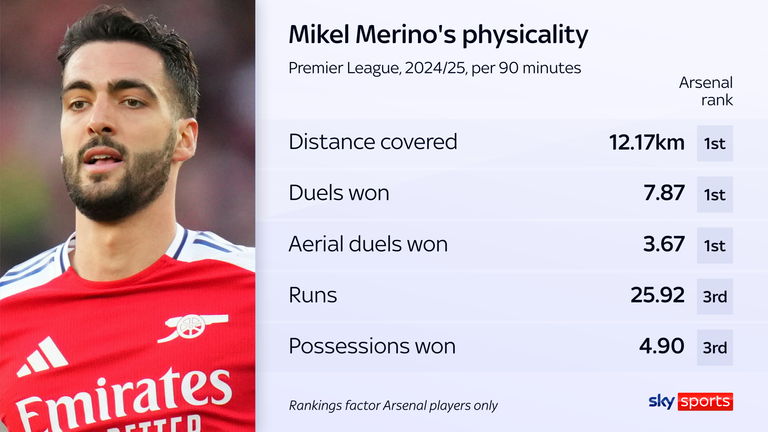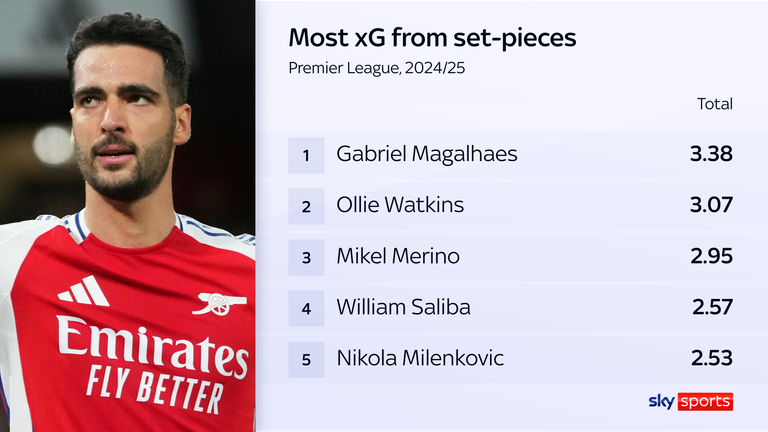
Few would have believed it earlier this season, when there were questions around the wisdom of signing him, but Mikel Merino faces Paris Saint-Germain this week as one of the most important players to Arsenal’s hopes of reaching the Champions League final.
The 28-year-old has excelled since being put up front by Mikel Arteta, providing six goals and four assists in 13 games, his best displays yet coming in the last-eight win over Real Madrid, when he scored in the first leg and set up both goals in the second. News of his return to training this week comes as a major boost.
Declan Rice and Bukayo Saka took most of the plaudits at the Bernabeu but Merino was just as good, his contribution rewarding the faith of his manager and calling to mind conversations with some of those who worked with him at boyhood club Osasuna.
“He never hides and is willing to confront difficult situations,” Alfredo Sanchez, a former coach, told Sky Sports in August. “He is a boy who doesn’t feel pressure and has the personality to step up in important games,” added Miguel Flano, a former team-mate.
Merino’s appetite for the big occasions will be needed again against Paris Saint-Germain on Tuesday, even if this time his assignment comes with a different set of tactical instructions.
Thomas Partey’s suspension means he could be required in midfield rather than up front, where Leandro Trossard, scorer of four goals in his last four Premier League games, will likely start.
Happily for Arsenal, Merino has excelled in both roles lately, even when nominally playing as a striker. His heat maps for his last 10 starts show how his positioning varies from game to game, reflecting the all-round offering that makes him such a useful asset tactically.

In the first leg against Real Madrid, when Arsenal dominated, most of Merino’s activity came in the final third and opposition box. In the second, when they spent long spells defending, he dropped into the low block, mostly operating in his own half but still making a decisive contribution offensively in the form of his two assists.
His tactical intelligence helped convince Arteta about his potential to thrive as a makeshift striker when Kai Havertz suffered his injury. “If anyone can adapt to a different position, it’s him,” he said in February. To quote his old team-mate Flano, “he also has the humility to understand what every game requires”.
It all adds up to a rare level of adaptability and versatility which makes Merino a weapon in a multitude of different scenarios, from game to game but also within games.
His displays up front have demonstrated his capacity to act as a focal point and penalty-box goal poacher, but he can be just as dangerous making late runs from midfield.
His goal in the 3-0 win over Real Madrid combined both elements. Before sweeping Myles Lewis-Skelly’s pass beyond Thibaut Courtois from just inside the box, Merino could be seen combining with Partey in the centre circle, then turning and releasing Rice before continuing his run.
The unpredictability of Merino’s movement caused Real Madrid problems and it could be key even in a different role on Tuesday, especially given Paris Saint-Germain have already had a look at Arsenal this season having faced them in the league phase, when they were beaten 2-0 at the Emirates Stadium in October.
Luis Enrique’s side are stronger now, with Ousmane Dembele moving into the middle of their front three and January signing Khvicha Kvaratskhelia installed on the right. But the midfield is likely to be similar to the one used then and that is where Merino can help.
In Vitinha, Paris Saint-Germain have an outstanding technician in the No 6 role but Arsenal won the physical battle in that last meeting and the added presence of Merino, who only appeared as a substitute that night, would enhance an already significant edge.
The Spain international was signed in part for his duel-winning prowess and it has shone through since his arrival in England. Merino wins more duels and more aerials than any other Arsenal player.
The midfield reshuffle required in Partey’s absence will likely see Rice moved from No 8 to No 6, giving him less opportunity to make the marauding runs which have become a feature of Arsenal’s play. But Merino, although not as quick, brings even more energy to the role.
Premier League tracking data shows he covers more ground than any other Arsenal player at 12.17km per 90 minutes. It is roughly a kilometre more than Rice, putting him top among team-mates and in the top 10 among all Premier League players.
His physicality could be invaluable in the opposition box as well as in the midfield battle. Set-pieces, an area of formidable strength for Arsenal, are one of weakness for Paris Saint-Germain, whose total of 15 goals conceded from dead-ball situations is the 12th-highest in Europe’s major leagues.
Merino might be Arsenal’s best hope of capitalising. His total of 2.95 expected goals from set-pieces is the third-highest in the Premier League, behind only those of his injured Arsenal team-mate Gabriel Magalhaes and Aston Villa striker Ollie Watkins.
It is an all the more impressive figure given he has played less than half of Arsenal’s minutes this season. At 0.19 expected goals from set-pieces per 90 minutes, he actually ranks top in the division.
It is just another area in which Merino could be decisive against Paris Saint-Germain, as he was against Real Madrid. Tuesday’s game is another opportunity for him to show his newfound importance as Arsenal continue their bid for Champions League success.
This news was originally published on this post .













Be the first to leave a comment